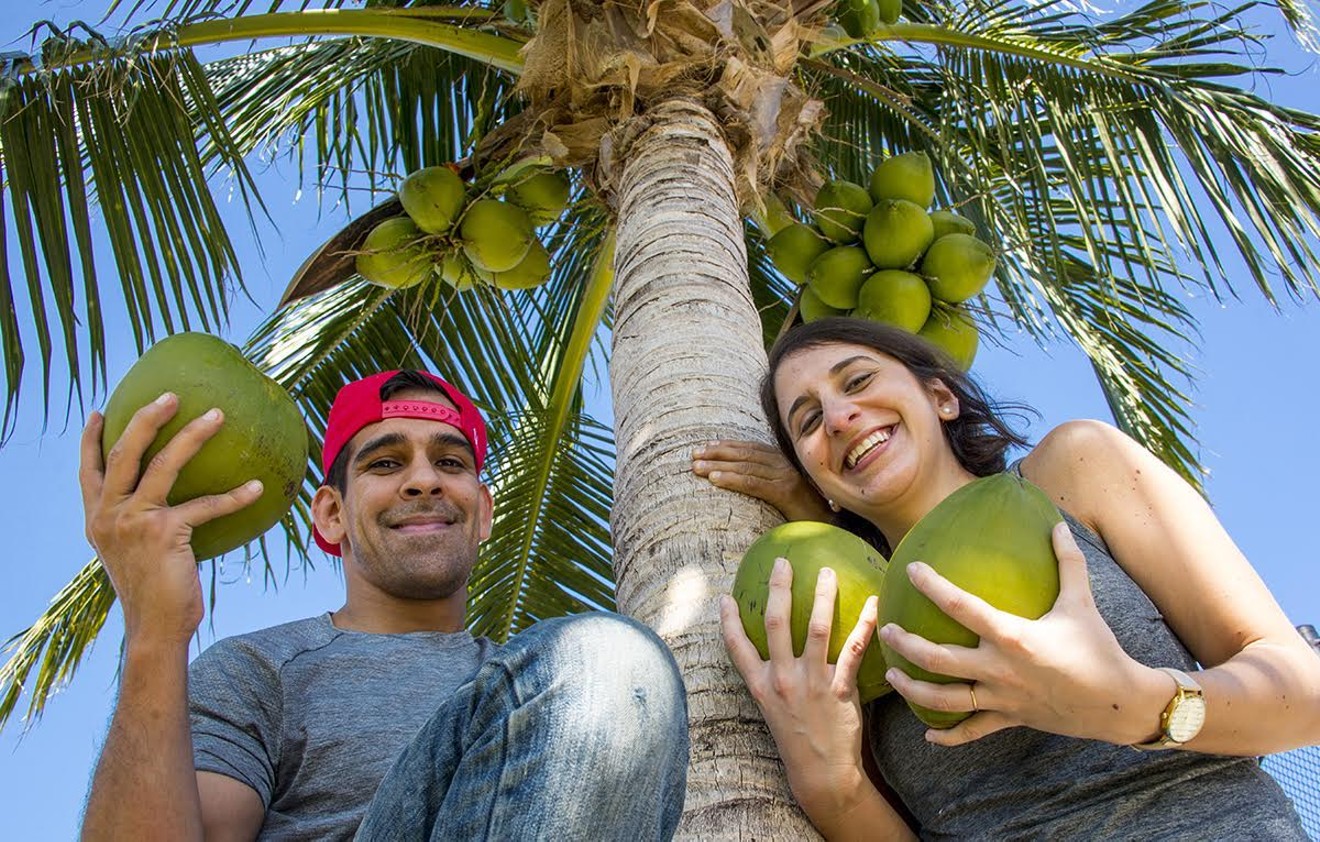Miami resident Hector Galvez remembers the first time he tried to climb a coconut tree.
"Going up was great, but on the way down, I developed so many blisters I could barely walk," Galvez says. "That was the last time I did it barefoot."
Now he uses dive booties — but that's not the only tip he has for you if you're interested in learning how to climb a tree to get your own free coconuts. To date, Galvez estimates he's scaled more than 150 trees using a mix of techniques and harvests anywhere from 20 to 30 coconuts in a single climb. He climbs using a machete and opens the fruit with a paring knife, and he can show you how to do the same.
A full-time physical therapy student by day, Galvez and his wife, Livia Monteiro, are the duo behind Miami's 305 Coconauts, an Instagram account and YouTube channel dedicated to educating South Floridians about Miami coconuts. Galvez says he got the idea two years ago, when the couple first relocated to South Florida.
"Where we were living, there were a bunch of coconuts, so I began climbing the tree. At first it was just for fun and to harvest the coconuts before they fell," Galvez says. "We began sharing videos with friends and family on our personal social media accounts, and people were really responsive to it."
Today, Galvez has no problem admitting his love for a burly, long-haired Samoan named Kap, the senior ambassador for the Polynesian Cultural Center. He began watching Kap's online "edutainer" tutorials on Polynesian, Hawaiian, and Samoan culture demonstrating everything from fire dancing and fire making to weaving and coconut husking.
"I basically have a man crush on the guy," says Galvez, who used Kap's videos to learn how to climb palm trees. "Coconuts are huge in Polynesian culture, from the harvest to how you use them. After some trial and error, I used Kap's videos to develop my own tree-climbing method."
Galvez is taking that inspiration to educate Miami about the plethora of coconuts available to them and also offers his services to those who have trees at home that need harvesting. He began climbing in parks and public spaces, which sparked dozens of conversations. These days, he and Monteiro carry straws with them everywhere they go and give the first few coconuts they pick to anyone who inquires about their efforts.
The couple enjoys showing others how to open a coconut properly and educating them on how to use all parts, from the fruit to the husk. More important, they say, Miami's public spaces are overflowing with coconuts that are free for the taking.
"Because it's a year-round fruit, there's no coconut season. They're always available," Galvez says. "Instead of paying money for coconuts at the store, why not take advantage of what's naturally available to South Floridians all the time? There are all these coconuts around us that aren't being utilized."
More than 100 species of coconut grow in Florida. Many of them produce fruit that takes anywhere from seven to nine months to mature before it's ready to harvest. After that time, the coconut will begin to produce an edible meat. And chopped husks make a great alternative to traditional mulch.
"There are so many uses for coconuts beyond water for hydration," Monteiro says. "It's all about getting the message out there, to be more aware of nature and your surroundings. There's so much she has to offer and be appreciative for."
[
{
"name": "Air - MediumRectangle - Inline Content - Mobile Display Size",
"component": "19274298",
"insertPoint": "2",
"requiredCountToDisplay": "2"
},{
"name": "Editor Picks",
"component": "17482312",
"insertPoint": "4",
"requiredCountToDisplay": "1"
},{
"name": "Inline Links",
"component": "18711090",
"insertPoint": "8th",
"startingPoint": 8,
"requiredCountToDisplay": "7",
"maxInsertions": 25
},{
"name": "Air - MediumRectangle - Combo - Inline Content",
"component": "17482310",
"insertPoint": "8th",
"startingPoint": 8,
"requiredCountToDisplay": "7",
"maxInsertions": 25
},{
"name": "Inline Links",
"component": "18711090",
"insertPoint": "8th",
"startingPoint": 12,
"requiredCountToDisplay": "11",
"maxInsertions": 25
},{
"name": "Air - Leaderboard Tower - Combo - Inline Content",
"component": "17482313",
"insertPoint": "8th",
"startingPoint": 12,
"requiredCountToDisplay": "11",
"maxInsertions": 25
}
]












